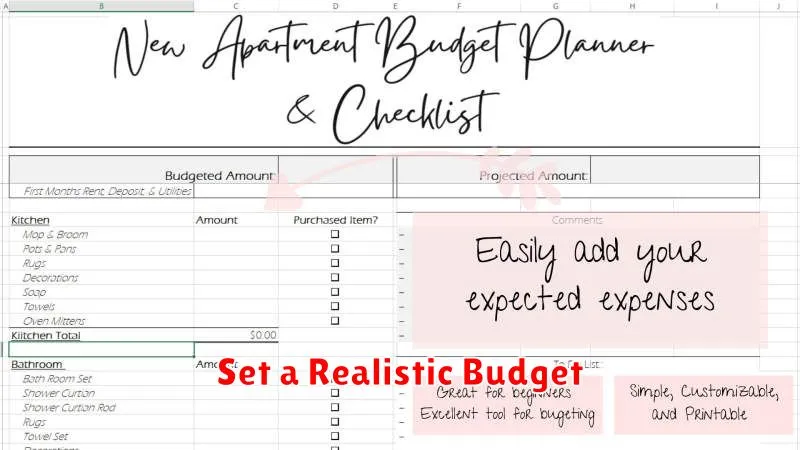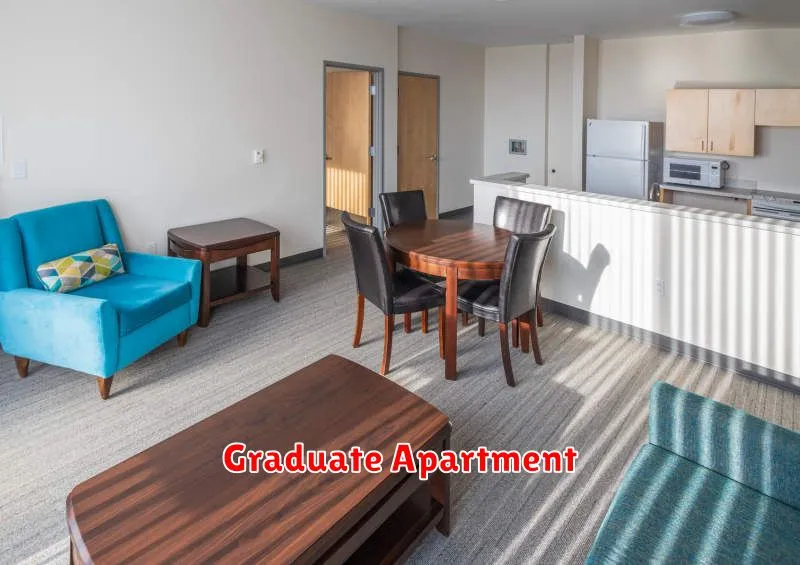Navigating the world of apartment renting can be daunting, especially for recent graduates entering the real world for the first time. From finding the perfect place to understanding leases and deposits, there are many factors to consider. This guide provides essential apartment renting tips specifically tailored for recent graduates, helping you navigate the process with confidence and find a place that fits your budget and lifestyle.
Set a Realistic Budget

As a recent graduate, you’re likely excited to start your new life and maybe even move into your first apartment. It’s essential to set a realistic budget before starting your apartment search. This will help you avoid overspending and ensure you can afford your rent and other expenses. Here are some tips for setting a realistic budget:
First, track your income and expenses. This will give you a clear picture of how much money you have coming in and going out each month. Consider your salary, any other income sources, and your regular expenses like food, transportation, utilities, and student loans.
Second, factor in the cost of living in your chosen area. Rent prices can vary significantly depending on location. Research average rent prices in the neighborhoods you’re interested in. Consider the cost of utilities, transportation, and other expenses that might be higher in certain areas.
Third, decide how much you can comfortably afford to spend on rent. A good rule of thumb is to spend no more than 30% of your gross income on rent. However, you may want to aim for a lower percentage if you have other financial obligations or want to save money.
Fourth, be realistic about your needs and wants. When searching for an apartment, it’s easy to get caught up in fancy amenities. Consider your lifestyle and prioritize your needs over wants. Decide what features are essential and which ones you can live without. Prioritizing your needs will help you stay within your budget.
By following these tips, you can set a realistic budget for your first apartment and avoid overspending. This will help you enjoy your new independence without financial stress.
Start Your Apartment Search Early
As a recent graduate, you’re likely excited about your new career and the independence that comes with it. Finding an apartment is an important part of this new chapter, and starting your search early is key.
One of the biggest mistakes recent graduates make is waiting until the last minute to start their apartment search. This can lead to a stressful and overwhelming experience. If you wait until a few weeks before your lease is up, you may find limited availability and have to settle for an apartment that doesn’t meet your needs.
Starting early gives you the opportunity to thoroughly research different neighborhoods, compare prices, and find the perfect place for you. You can also take your time to visit potential apartments, ask questions, and negotiate a good lease agreement.
Don’t wait until the last minute. Start your apartment search early and give yourself the best chance of finding the perfect place to call home.
Consider Location and Commute
One of the most important factors to consider when renting an apartment is its location and your commute. A great apartment in a terrible location can be a nightmare. Factor in your work location, the distance and cost of commuting, and the time it will take you to get to work. If your job is remote, think about your daily life and where you want to spend most of your time. Do you want to be near restaurants, shopping, and entertainment? Or would you prefer a more peaceful and quiet neighborhood?
Consider these questions:
- How easy is it to get to work from the apartment?
- How much will it cost to commute, including parking?
- What are the public transportation options like?
- How much time will it take you to get to work during rush hour?
- What is the crime rate in the area?
- Are there any amenities in the area that are important to you, such as parks, libraries, or gyms?
You may also want to consider if you prefer a walkable area with shops and restaurants within walking distance. Having easy access to public transport will also make navigating your new city much more accessible. Once you have a good idea of where you want to live, you can start looking at specific apartments in those areas.
Explore Roommate Options
Living with roommates can significantly reduce your housing costs, making it a more affordable option for recent graduates. However, finding the right roommates is crucial for a positive living experience. Start by considering your lifestyle and preferences. Do you prefer a quiet environment or are you more outgoing? Are you a clean freak or more laid-back? Once you have a clear picture of your needs, you can begin searching for compatible roommates.
There are various ways to find roommates. Online platforms like Craigslist, Facebook groups, and Roomster are popular options. You can also ask friends, family, and professors for recommendations. When contacting potential roommates, it’s essential to be clear about your expectations, including your budget, lifestyle, and preferred living arrangements.
Remember to conduct thorough background checks on potential roommates. Ask for references and verify their identities. It’s also a good idea to meet in person before committing to live together. This will allow you to get a better sense of their personality and compatibility.
Ultimately, finding the right roommates can make a big difference in your overall living experience. By taking the time to explore your options carefully, you can increase your chances of finding compatible and responsible roommates who will make your transition into independent living smoother.
Check Apartment Reviews and Ratings
As a recent graduate, you’re likely looking for a new place to call home. Finding the perfect apartment can be a daunting task, but checking apartment reviews and ratings is a crucial step in the process. These reviews offer valuable insights from previous tenants, providing you with an unbiased perspective on the apartment complex, its amenities, and the management team.
Websites like Apartments.com, Rent.com, and Google Reviews allow you to browse through ratings and comments left by previous tenants. Pay close attention to the following:
- Maintenance Response Time: How quickly does the management address maintenance issues?
- Noise Levels: Are the apartments noisy, particularly if you’re looking for a quiet living environment?
- Safety and Security: How safe do residents feel in the complex?
- Overall Satisfaction: What is the general consensus on the quality of living at the apartment complex?
Remember that some reviews may be biased or exaggerated, so read through multiple reviews and look for common themes. By taking the time to check apartment reviews and ratings, you can gain a better understanding of what life would be like at a particular complex and make a more informed decision about your rental choice.
Understand Lease Terms and Responsibilities
As a recent graduate, finding an apartment can be exciting. However, it’s crucial to understand the terms and responsibilities outlined in your lease agreement. This document will outline the rules and expectations of living in that apartment, including rent payments, lease duration, and any restrictions.
Carefully read through the entire lease before signing it. Pay close attention to the following key areas:
- Rent amount and due date: Ensure you understand the monthly rent amount and when it’s due each month.
- Lease duration: This specifies how long you’re obligated to live in the apartment. Be aware of any penalties for breaking the lease early.
- Pet policies: If you have pets, ensure they’re allowed, and understand any associated fees or restrictions.
- Maintenance responsibilities: The lease will outline who’s responsible for repairs and maintenance.
- Late fees: Understand the consequences of late rent payments, and set reminders to avoid any penalties.
If you have any questions or concerns, don’t hesitate to ask your landlord or property manager for clarification. Understanding your lease terms will prevent misunderstandings and protect you financially.
Negotiate Rent and Security Deposit
As a recent graduate, you’re likely on a tight budget, so it’s essential to try and negotiate the best possible terms for your apartment. This includes the rent and security deposit. While landlords may be hesitant to negotiate, it’s worth a try, especially if you’re willing to sign a longer lease or have good credit. Here are some tips for negotiating:
Research: Before starting the negotiation, research the average rent and security deposit for similar apartments in the area. This will give you an idea of what’s fair and reasonable. You can use online resources like Zillow, Trulia, and Apartments.com to get this information.
Time It Right: The best time to negotiate is when the market is slow or when the landlord is eager to fill a vacancy. You can try to negotiate during off-peak seasons, or if you find an apartment that has been vacant for a while.
Offer a Longer Lease: Landlords often prefer tenants who are willing to sign longer leases as it provides more stability. Offering to sign a longer lease (e.g., 24 months instead of 12) may be a good way to sweeten the deal.
Pay Rent Early: If you demonstrate a willingness to pay rent on time, it can show the landlord that you’re a reliable tenant, which may encourage them to negotiate on other terms.
Be Professional and Prepared: When you approach the landlord, be polite and professional. Present your arguments clearly and back them up with relevant information. It’s also helpful to have a written offer in hand that outlines your desired terms.
Be Ready to Walk Away: It’s important to be prepared to walk away from a deal if the landlord isn’t willing to negotiate. You can find another apartment that better suits your needs and budget.
Document Everything
As a recent graduate, renting your first apartment can be exciting, but it’s also important to be prepared. One crucial step is to document everything. This includes all communication with your landlord, any maintenance requests, and any issues you encounter with your apartment.
Keeping a detailed record of communication helps protect you in case of any disagreements or disputes. It provides evidence of what was discussed, agreed upon, and any promises made by your landlord. This documentation can be crucial in resolving any issues that may arise later.
For maintenance requests, keep records of the date you submitted the request, the nature of the problem, and any communication you had with the landlord regarding the repair. This ensures you have proof that you reported the issue and can follow up if the repair isn’t completed within a reasonable timeframe.
Documenting any issues you encounter with your apartment, such as damage or defects, is equally important. Include photos, videos, and detailed descriptions of the problem. This documentation can be useful in negotiating a repair or a reduction in rent.
By taking the time to document everything, you’re creating a valuable resource for yourself that can be used to protect your rights and ensure a smoother renting experience.
Prepare for Moving Expenses
Moving into a new apartment can be exciting, but it can also be expensive. Moving expenses can add up quickly, so it’s important to budget accordingly. Here are a few tips for preparing for moving expenses:
Start saving early. Set a budget for your moving expenses and start saving as soon as possible. You can also look for ways to cut costs, such as moving during the off-season or hiring movers instead of doing it yourself.
Get quotes from different movers. If you’re hiring movers, get quotes from several different companies. Compare their prices and services to find the best deal. You can also consider renting a truck and moving your belongings yourself, which can be a more affordable option.
Pack efficiently. The more you can pack yourself, the less you’ll have to pay for movers. Use boxes, tape, and packing materials to protect your belongings. You can also consider donating or selling unwanted items to reduce the amount of stuff you need to move.
Consider the cost of utilities. Don’t forget to factor in the cost of utilities, such as electricity, gas, and water. You’ll also need to pay for internet and cable if you want those services.
Factor in unexpected costs. It’s always a good idea to have a little extra cash on hand for unexpected costs, such as repairs or cleaning fees. Moving can be stressful, so it’s best to be prepared for anything.
Get Renters Insurance
As a recent graduate, you’re probably excited to move into your first apartment. It’s a big step towards independence, and it comes with a lot of new responsibilities, including protecting your belongings. Renters insurance is a crucial part of that. This affordable insurance policy covers your personal belongings against theft, fire, and other disasters. It also provides liability protection if someone gets hurt on your property. Even if your landlord has insurance for the building, it doesn’t cover your personal items.
Renters insurance is a wise investment for anyone renting an apartment. It provides peace of mind knowing that your belongings are protected, and it can save you a lot of money in the long run if you have to file a claim. If you’re a recent graduate, consider it a priority when setting up your new apartment.
Build Your Credit Score

Having a good credit score is essential for renting an apartment, especially as a recent graduate. Landlords often use your credit score to assess your financial responsibility and ability to pay rent on time. A good credit score can help you secure an apartment, qualify for better rental rates, and even get your security deposit back. Here are some tips for building your credit score:
Become an authorized user on a parent’s or guardian’s credit card. This allows you to benefit from their good credit history without having to manage your own card. However, ensure that they’re responsible with their credit and pay their bills on time.
Get a secured credit card. Secured credit cards require you to make a security deposit that acts as collateral. This reduces the risk for the issuer and makes it easier to get approved. Make sure to use the card responsibly and pay your balance in full each month.
Pay your bills on time. Late payments can significantly damage your credit score. Set reminders or use automatic payments to ensure timely payments.
Keep your credit utilization low. Your credit utilization ratio is the amount of credit you’re using compared to your total credit limit. Aim to keep it below 30%.
Monitor your credit report regularly. You’re entitled to a free credit report from each of the three major credit bureaus annually. Check for errors and report any discrepancies.
Building a strong credit score takes time and effort, but it’s a crucial step towards securing a comfortable and affordable apartment as a recent graduate.
Connect Utilities and Services
After you’ve signed your lease and gotten the keys to your new apartment, it’s time to connect essential utilities and services. These include electricity, gas, water, internet, and trash removal. Many landlords handle trash service, but it’s always good to confirm.
Start by contacting the utility providers in your area. Most companies have easy-to-use online portals or mobile apps to set up new accounts. Make sure to have your lease information and your apartment’s address handy.
For internet service, you can choose from cable companies, fiber optic providers, and even satellite options. Compare plans and prices to find the best fit for your budget and internet usage needs.
It’s a good idea to schedule your utility hookups a few days before your move-in date to avoid any interruptions in service. You’ll also need to pay a security deposit for most utilities, so factor that into your budget.
Maintain a Good Relationship with Your Landlord
Your landlord is your first point of contact for any issues you may have with your apartment. A good relationship with them will ensure that repairs are handled quickly and efficiently, and that you can communicate openly and honestly about any concerns. Remember, they are responsible for maintaining the property and ensuring it’s a safe and comfortable place to live.
Here are some ways to build a strong relationship with your landlord:
- Communicate clearly and promptly. When you have a maintenance request, don’t hesitate to reach out. If something needs to be fixed, let your landlord know right away. Use email to document all your communication.
- Be respectful of their time. Try to schedule maintenance requests during reasonable hours. And if you need to cancel a scheduled appointment, give them plenty of notice.
- Be a responsible tenant. Pay your rent on time and follow the terms of your lease agreement. You’ll have a much easier time if you’re always paying on time and keeping the apartment in good condition.
- Be proactive. If you notice a small issue that might escalate into a bigger problem, let your landlord know. For example, if you see a leaky faucet, address it as soon as possible.
- Be courteous. Always be polite and respectful in your interactions with your landlord. Even if you have a complaint, you can still be polite and respectful while making your concerns known.
Building a positive relationship with your landlord will make your apartment experience much smoother. By being respectful, communicative, and responsible, you can ensure a positive and productive relationship with your landlord.

